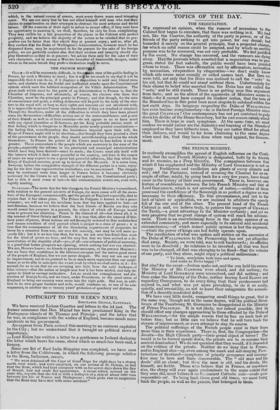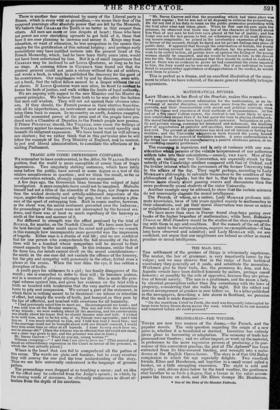THE FRENCH MINISTRY.
IT curiously exemplifies the spread of English influence on the Conti- nent, that the new French Ministry is designated, both by its friends and its enemies, as a Tory Ministry. The comparison between that which it has supplanted and the Ministry of Lord GODERICH is not so happy. Feebleness and vacillation are plants of every climate and Boll ; and the Parisians, instead of crossing the Channel for an ex- ample of eitheronight, by going back for a very few years, have found enow in the history of their own government. There is, however, one feature of resemblance between the late French Ministry and that of Lord GODERICH, which is not unworthy .of notice,—neither of them possessed the confidence of the Sovereign in so perfect a degree as was necessary to their efficiency. To this circumstance, and not to the lack of talent or application, we are inclined to attribute the speedy fall of the one and of the other. The present head of the French Cabinet is said, we belieVe truly, to possess the support of CHARLES the Tenth,—a great advantage to the Minister certainly; and yet we may prophesy that no great change of system will mark his advance- ment. There is an overwhelming force in the public opinion of an extended community, and more especially in its natural and accidental circumstances,—of which indeed public opinion is but the exponent, —which the power of kings can but feebly operate upon. The recollection of what was spoken and written on the accession of the Duke of WELLINGTGN.to the Premiership has not yet altogether died away. Society, we were told, was to roll backwards • its affinities were to be dissolved ; its relations to be inverted ; all that was fixed was to be changed, all that was changing to be fixed—=that the votaries of one party, and they alone, might enjoy a political millennium : " Ye Gods, annihilate both time and space, And make us Tories happy !"
But alas I for the event—Joshua spake not, and the sun held his course. The Ministry of Mr. CANNING were afraid, and did nothing; the Ministry of Lord Goocition were 'unresolved, and did nothing ; and then came the Ministry of the Duke, neither fearing Lord ELDON nor regarding Orangemen, to do every thing that their predecessors had aspired to, and what was yet more provoking, to do it so coolly, quietly, and irresistibly, as not to leave their antagonists the consola- tion of a decently-contested defeat. We have very little doubt, comparing small things to great, that in the same way, though not in the same degree, will the Strut- brags of the Fauxbourg St. Germains be disappointed in the Ministry of Prince POLIGNAC. b It is not likely, nor indeed possible, that he should effect any changes approaching to those effected by the Duke of WELLINGTON,—for the simple reason that he has no such task set before him ; but as little can we believe that he will turn back the stream of improvement-, or even attempt to stay its course. The political sufferings of the French people exist in their fears more than in their experience.' There is, first, the Congregation—the Jesuits—the High Church party—their grand object of terror ! The world is to be turned upside down, the priests are to re-assume their ancient domination ! We do not question that they would, if it,depended on the volition of the priests. Neither do we deny that in France, and in England also—ay, even among the meek and self-denying Pres- bytedans of Scotland—symptoms of priestly arrogance and assump- tion may be here and there discoverable. The " old man and his deeds" still go about; but then the man is old, and his deeds, like himself, are feeble. Those who believe that in France, or anywhere else, the clergy will ever again predominate to the same extent that they once did, must believe it on the ancient Catholic rule—credo Oa impossibile est. To bring back those good old times, we must bnng, back the people, as well as the priests, that belonged to then'. There is another fear entertained by many of the Liberal party in France, which is every whit as groundless,—we mean their fear of the supposed yearnings after absolute power that are felt by the Monarch. We believe that CHARLES the Tenth is no better in that respect than others. All men are more or less despots at heart; those who have not power are ever stretching upwards to get hold of it, those that have it are ever planning to increase and secure it. Kings may from education, or want of education, be less scrupulous in the means they employ for the gratification of this natural longing; and perhaps early associations may have instilled notions into the present head of the French Monarchy, which, had he been born thirty years later, would not have been entertained by him. Butit is of small importance that CHARLES may be inclined to act Louis quatorze, so long as he has no stage. A cunning fellow in CICERO'S time found out that the greatest general could not gain a victory without the aid of soldiers, and wrote a book, in which he published the discovery for the good of his countrymen. Our neighbours will by and by discover, even with- out a book, that the tallest fellow cannot be a despot without the' aid of slaves. If Louis Quatorze were now alive, he must be mutant to forego his beds of justice, and walk within the limits of legal authority. We are arguing with regard to the new Minister and his Master on general principles. We believe them both to be wise after the fashion that men call wisdom. They will not act against their obvious inter- ests. If they should, the French possess in 'their elective franchise, with all its imperfections, an instrumept most admirably calculated to bring them back to reason. In no country on earth, America excepted, could the unassisted power of the press and of the people have pro- duced such a Chamber of Deputies as the French people now possess. If Prince POLIGNAC should, like VILLELE, once rouse the feelings of the country against his measures, like VILLELE he would speedily sink beneath its indignant expression. We have heard that he will advise a new election; but we rather think that in this particular also he will follow the example of the Tory Ministry of England, and be content, by just and liberal administration, to conciliate the affections of the existing Parliament.



















 Previous page
Previous page